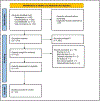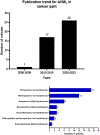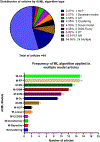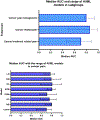Artificial Intelligence and Machine Learning in Cancer Pain: A Systematic Review
- PMID: 39097246
- PMCID: PMC11534522
- DOI: 10.1016/j.jpainsymman.2024.07.025
Artificial Intelligence and Machine Learning in Cancer Pain: A Systematic Review
Abstract
Background/objectives: Pain is a challenging multifaceted symptom reported by most cancer patients. This systematic review aims to explore applications of artificial intelligence/machine learning (AI/ML) in predicting pain-related outcomes and pain management in cancer.
Methods: A comprehensive search of Ovid MEDLINE, EMBASE and Web of Science databases was conducted using terms: "Cancer," "Pain," "Pain Management," "Analgesics," "Artificial Intelligence," "Machine Learning," and "Neural Networks" published up to September 7, 2023. AI/ML models, their validation and performance were summarized. Quality assessment was conducted using PROBAST risk-of-bias andadherence to TRIPOD guidelines.
Results: Forty four studies from 2006 to 2023 were included. Nineteen studies used AI/ML for classifying pain after cancer therapy [median AUC 0.80 (range 0.76-0.94)]. Eighteen studies focused on cancer pain research [median AUC 0.86 (range 0.50-0.99)], and 7 focused on applying AI/ML for cancer pain management, [median AUC 0.71 (range 0.47-0.89)]. Median AUC (0.77) of models across all studies. Random forest models demonstrated the highest performance (median AUC 0.81), lasso models had the highest median sensitivity (1), while Support Vector Machine had the highest median specificity (0.74). Overall adherence to TRIPOD guidelines was 70.7%. Overall, high risk-of-bias (77.3%), lack of external validation (14%) and clinical application (23%) was detected. Reporting of model calibration was also missing (5%).
Conclusion: Implementation of AI/ML tools promises significant advances in the classification, risk stratification, and management decisions for cancer pain. Further research focusing on quality improvement, model calibration, rigorous external clinical validation in real healthcare settings is imperative for ensuring its practical and reliable application in clinical practice.
Keywords: Cancer pain; artificial intelligence; cancer pain management; machine learning.
Copyright © 2024 The Authors. Published by Elsevier Inc. All rights reserved.
Conflict of interest statement
Conflict of interest:
Authors declare that they have no known competing commercial, financial interests or personal relationships that could be constructed as potential conflict of interest.
Figures







Update of
-
Artificial Intelligence and Machine Learning in Cancer Related Pain: A Systematic Review.medRxiv [Preprint]. 2023 Dec 8:2023.12.06.23299610. doi: 10.1101/2023.12.06.23299610. medRxiv. 2023. Update in: J Pain Symptom Manage. 2024 Dec;68(6):e462-e490. doi: 10.1016/j.jpainsymman.2024.07.025. PMID: 38105979 Free PMC article. Updated. Preprint.
References
-
- Mitchell TM. Machine Learning 1997; Mitchell TM. Does machine learning really work? AI Magazine. 18(3):11.
Publication types
MeSH terms
Grants and funding
LinkOut - more resources
Full Text Sources
Medical

